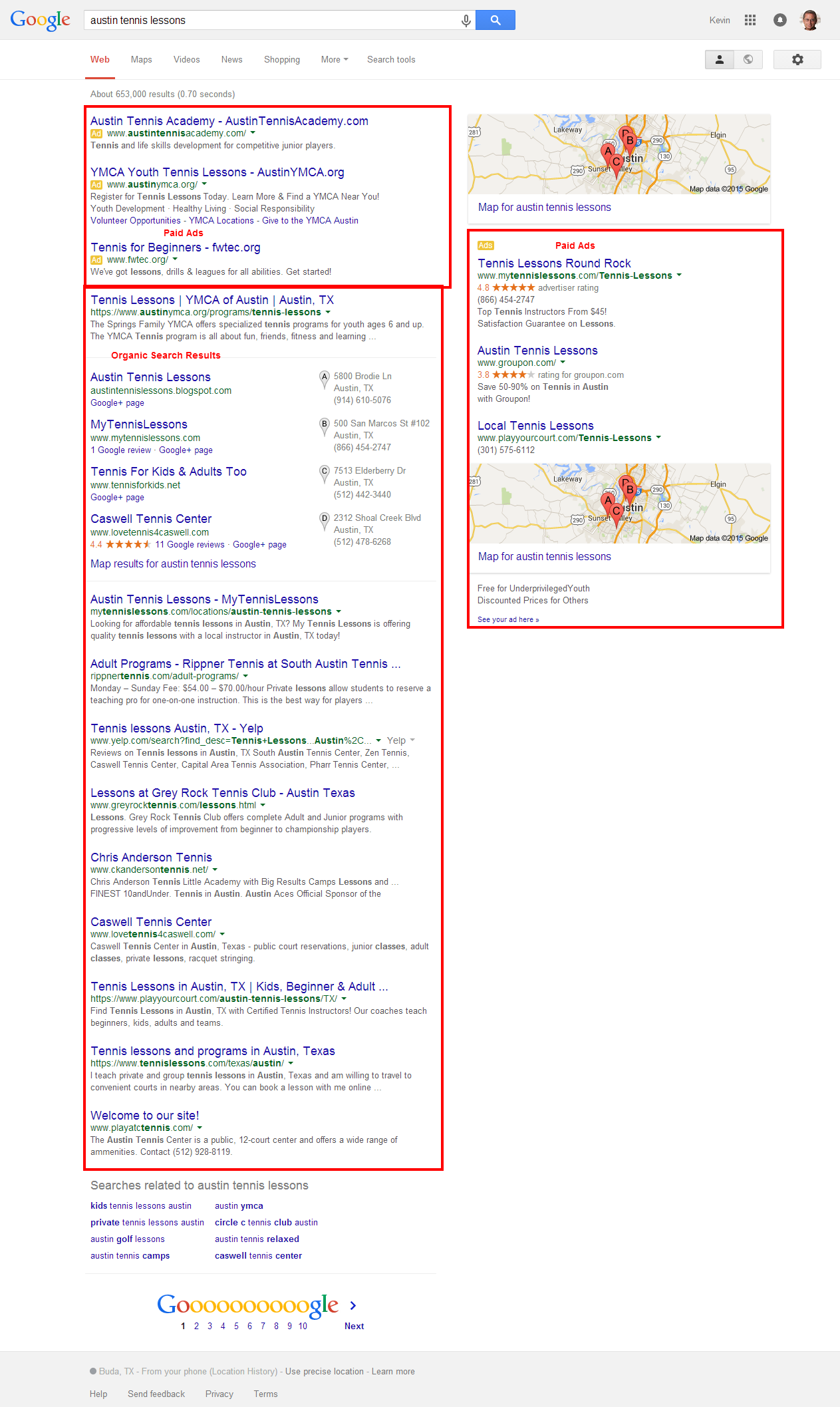
There are three primary reasons why a blog on your website should be at the helm of your online marketing strategy:

- Blogging is the core activity of Inbound Marketing, where you attract visitors though organic search and convert those website visitors into leads.
- Visitors who arrive from organic search are the highest quality website visitors you’ll find. After all, they found you.
- Attracting visitors to your website via organic search is not as hard as most people think. It does take time, but anyone can do it, and as stated in #1, the core activity in doing so is blogging.
Email and social media marketing have their place in your online efforts, but as add-ons to your blogging activity, not instead of it.
Why Are Visitors from Organic Search So Important?
When we’re presented with a Search Engine Result Page (such as the one below), 94% of the time we choose something within the organic search results area. Additionally, per a recent study published by BrightEdge (a large digital advertising agency) 51% of all website visitors arrive via organic search.
Related Article: 3 Simple Steps to Maintain a Successful Company Blog
If for no other reasons that those two, having visitors show up to your website through organic search is important to your business.

When You Share Via Email and Social Media, What Are You Sharing?
Small business owners have told me that doing some email marketing and some social media marketing is better than doing nothing. That may be, but if it is better, it’s only slightly better.
This is because you’re not building up residual value in your website, which is the one piece of the Internet you own and control.
You’ll find numerous articles on the Internet discussing the many benefits of blogging that are not directly related to increasing the search ranking of your website.
Examples are:
- It helps to establish your brand
- It helps create authority
- It helps establish you as a thought leader
- It creates opportunities for sharing your articles and stories.
All of the above are true, and when you use email and/or social media marketing but you’re not sharing original content on your website, you’ll wind up sharing interesting stuff you find on other websites. This provides those benefits to other people and other websites.
Are You Gathering Your Crowd on a Social Media Site?
We’ve all heard of the importance of a Facebook Business Page and the collecting of Likes to that page. The (sometimes potential and sometimes real) problem with this strategy is you don’t own the site and you don’t make the rules.
I’ll specifically use Facebook as an example because of a recent announcement of theirs, but this issue is equally true of every Social Media site where you can create a business presence and gather a following.
But continuing with the Facebook example… Let’s discuss “Fred,” who owns a business that sells and repairs bicycles. A few years ago Fred created a Facebook Business Page. Fred then diligently collected Facebook Likes (some of which he obtained with paid ads) and he’s been diligently posting updates. He’s been successful in generating engagement, and the Facebook Business Page is bringing in a steady stream of business.
During those years Facebook grew, which at face value should be good for people with business pages. However, as Facebook grew, more and more of us started following more and more people and businesses. At some point the greater Facebook community told Facebook they want to see a change to the algorithm that determines what is and is not seen in our individual feeds. We told Facebook we want to see more news and more updates from our closest friends.
Facebook listened and changed their algorithm. On April 21st Facebook announced we will now see more news and more updates from our closest friends and less of everything else.
That “everything else” includes Fred’s business page (and yours). Now his updates to his Facebook Business Page are rarely seen by people who once saw them frequently. Fred did everything right, then Facebook changed the rules. They can do this because they own the site. They didn’t do it to hurt you (or Fred). They did it in response to their users.
Business owners have told me they’re thinking of blogging on LinkedIn as it avoids the need to have their own website. I try to talk them out of that. LinkedIn may never do something similar to what Facebook did, but if they ever do (for whatever reason) there will be nothing you can do about it, and they might undo overnight what you spend years building up.
The Best Place to Gather Your Crowd is Your Blog on Your Website
Email marketing and social media marketing help you do this when you make your blog the center piece of your online marketing efforts. With the ease of developing WordPress sites, you can even add a social media-like forum very easily and literally turn your website into a social network.
To get a feel for the potential of this, check out Inbound.org, a website forum where Inbound Marketing professionals gather to exchange ideas.
Author: Kevin Carney is an expert in Inbound Marketing who teaches and writes on the topics of Inbound Marketing, SEO, and WordPress. Kevin founded and runs Inbound Marketing University, the online school and community where people learn how to attract their desired audience to their website and convert website visitors into prospects. Kevin can be followed on social media at @kevinbcarney, +KevinCarney, and LinkedIn, and contacted on the Inbound Marketing University Website.
Published: June 18, 2015
2376 Views
2376 Views












